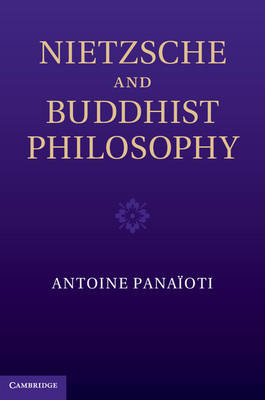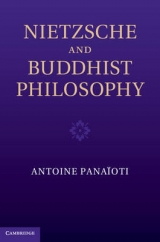Nietzsche and Buddhist Philosophy
Seiten
2012
Cambridge University Press (Verlag)
978-1-107-03162-3 (ISBN)
Cambridge University Press (Verlag)
978-1-107-03162-3 (ISBN)
An exploration of the complex and interesting relations between Nietzsche's philosophical thought and the Buddhist philosophy which he admired and opposed. The volume will appeal to students and scholars interested in Nietzsche's philosophy, Buddhist thought and in the metaphysical, existential and ethical issues that emerge with the demise of theism.
Nietzsche once proclaimed himself the 'Buddha of Europe', and throughout his life Buddhism held enormous interest for him. While he followed Buddhist thinking in demolishing what he regarded as the two-headed delusion of Being and Self, he saw himself as advocating a response to the ensuing nihilist crisis that was diametrically opposed to that of his Indian counterpart. In this book Antoine Panaïoti explores the deep and complex relations between Nietzsche's views and Buddhist philosophy. He discusses the psychological models and theories which underlie their supposedly opposing ethics of 'great health' and explodes the apparent dichotomy between Nietzsche's Dionysian life-affirmation and Buddhist life-negation, arguing for a novel, hybrid response to the challenge of formulating a tenable post-nihilist ethics. His book will interest students and scholars of Nietzsche's philosophy, Buddhist thought and the metaphysical, existential and ethical issues that emerge with the demise of theism.
Nietzsche once proclaimed himself the 'Buddha of Europe', and throughout his life Buddhism held enormous interest for him. While he followed Buddhist thinking in demolishing what he regarded as the two-headed delusion of Being and Self, he saw himself as advocating a response to the ensuing nihilist crisis that was diametrically opposed to that of his Indian counterpart. In this book Antoine Panaïoti explores the deep and complex relations between Nietzsche's views and Buddhist philosophy. He discusses the psychological models and theories which underlie their supposedly opposing ethics of 'great health' and explodes the apparent dichotomy between Nietzsche's Dionysian life-affirmation and Buddhist life-negation, arguing for a novel, hybrid response to the challenge of formulating a tenable post-nihilist ethics. His book will interest students and scholars of Nietzsche's philosophy, Buddhist thought and the metaphysical, existential and ethical issues that emerge with the demise of theism.
Antoine Panaïoti is lecturer in philosophy and post-doctoral fellow at the Centre of Research in Ethics at the University of Montreal.
Introduction; Part I. Nihilism and Buddhism: 1. Nietzsche as Buddha; 2. Nietzsche as anti-Buddha; Part II. Suffering: 3. Amor Fati and the affirmation of suffering; 4. Nirvāna and the cessation of suffering; Part III. Compassion: 5. Overcoming compassion; 6. Cultivating compassion; Conclusion: toward a new response to the challenge of nihilism.
| Verlagsort | Cambridge |
|---|---|
| Sprache | englisch |
| Maße | 152 x 229 mm |
| Gewicht | 550 g |
| Themenwelt | Geisteswissenschaften ► Philosophie ► Geschichte der Philosophie |
| Geisteswissenschaften ► Philosophie ► Östliche Philosophie | |
| Geisteswissenschaften ► Philosophie ► Philosophie der Neuzeit | |
| Geisteswissenschaften ► Religion / Theologie ► Buddhismus | |
| Sozialwissenschaften | |
| ISBN-10 | 1-107-03162-1 / 1107031621 |
| ISBN-13 | 978-1-107-03162-3 / 9781107031623 |
| Zustand | Neuware |
| Haben Sie eine Frage zum Produkt? |
Mehr entdecken
aus dem Bereich
aus dem Bereich
die kolonialen Wurzeln der französischen Theorie
Buch | Hardcover (2024)
Matthes & Seitz Berlin (Verlag)
28,00 €
eine Geschichte der Zuversicht von Homer bis zum Klimawandel
Buch | Hardcover (2024)
C.H.Beck (Verlag)
28,00 €




